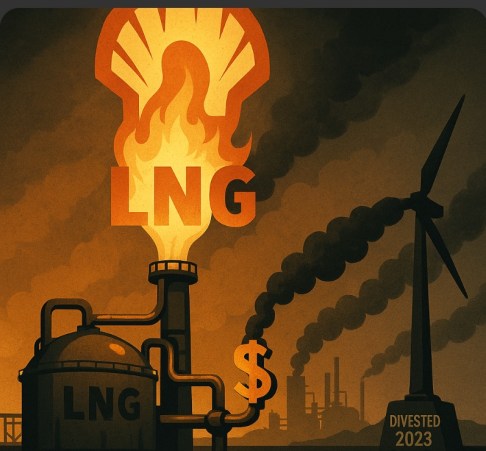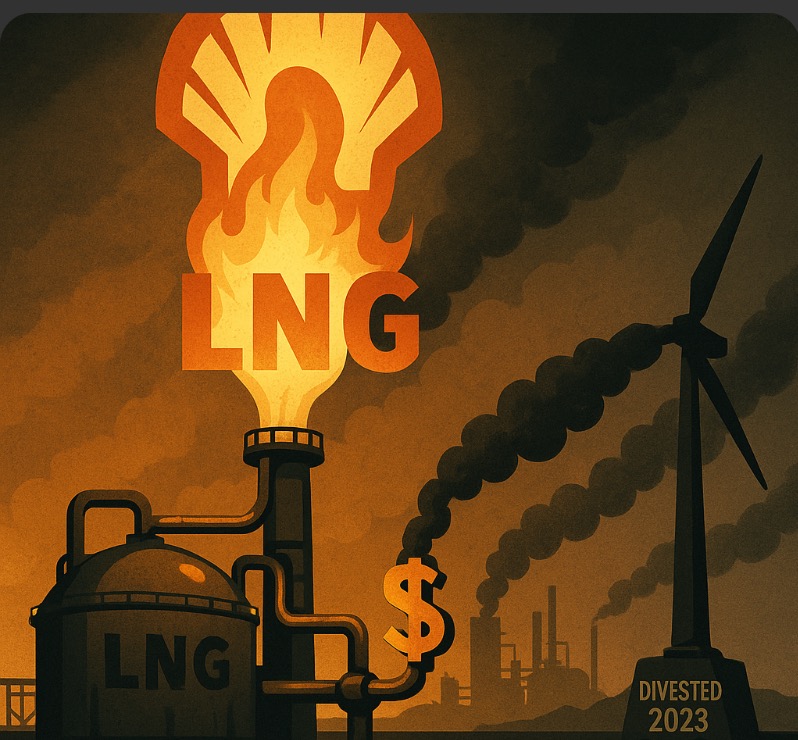
Shell CEO Wael Sawan has finally shown his hand: the company’s main contribution to the energy industry for the next decade will be liquefied natural gas (LNG). Not wind. Not solar. Not storage. LNG. The same fossil fuel dressed up as a climate saviour.
What Sawan Said
At the Economic Club of New York, Sawan declared:
“We are absolutely committed to this sector.”
He argued LNG is “one of the most effective fuels” for lowering emissions because it can displace coal in Asia, citing India and China. (Reuters)
Shell forecasts 60% growth in LNG demand by 2040, with LNG making up 20% of global natural gas sales (up from ~13% now).
The Reality Check
Coal substitution myth: LNG still emits methane—far more potent than CO₂. Studies show “coal-to-gas switching” is often oversold.
Pivot away from renewables: Since taking over in 2023, Sawan has cut wind, solar, and hydrogen investments, pivoting capital to gas projects in Abu Dhabi, Nigeria, Canada, and Qatar. (OilPrice)
Market glut risk: Sawan himself admitted that the number of LNG final investment decisions worldwide is “not economically fully rational,” warning oversupply could crush margins. Yet Shell presses ahead.
WTF Shell?
Shell says it wants to lead in transition. Its actual strategy? Ten more years betting on a fossil fuel.
LNG is still gas, still carbon.
Investors like BlackRock and Vanguard, Shell’s biggest backers, talk about ESG responsibility—yet here’s Shell doubling down on hydrocarbons and calling it “climate leadership.”
The Prelude FLNG debacle in Australia showed Shell can’t even keep the lights on at its flagship LNG project without blackouts and evacuations. Now they want to scale up the model globally.
The Canadian Love Fest
Sawan praised LNG Canada, Shell’s megaproject in British Columbia, saying:
“I don’t think I’ve ever seen the stars as well aligned as I see now in Canada.”
Translation: Ottawa and Victoria are rolling out subsidies and permits, and Shell smells free money. Canadian Prime Minister Mark Carney has even listed LNG Canada Phase 2 as a “nation-building” project. Apparently, “nation-building” means building export terminals for multinationals.
The Bigger Picture
This is Shell’s legacy strategy: slap a “lower carbon” sticker on a fossil fuel, expand production, trumpet ESG buzzwords, and hope the public can’t tell the difference between progress and delay.
Victory for shareholders in the short term? Maybe. Victory for the climate? Hardly.
Disclaimer
Warning: satire ahead. The criticisms are pointed, the humour intentional, and the facts stubbornly real. Quotes are reproduced word-for-word from trusted sources. As for authorship—John Donovan and AI both claim credit, but the jury’s still out on who was really in charge.
This website and sisters royaldutchshellgroup.com, shellnazihistory.com, royaldutchshell.website,
johndonovan.website, shellnews.net, and shellwikipedia.com,
are owned by John Donovan. There is also a Wikipedia segment.
